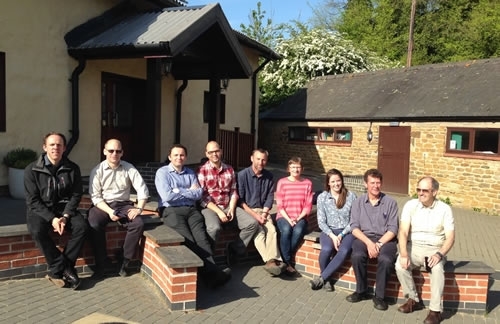By Chris Stoate, Head of Allerton Project Research
This month we celebrate our first quarter century of research and educational activities at Loddington. Over the twenty-five years, the Allerton Project has become a byword for practical evidence-based information on a wide range of agri-environmental issues and it is a real privilege to have played an active part in the project for the whole of that time.
On the night of 24 February 1992, our first data were collected from the farm when I ventured north from Dorset to count hares at Loddington. We still monitor hare numbers on the farm, as well as gamebirds and songbirds, using the same methods that we used twenty-five years ago, creating a consistent and valuable long-term dataset.

Examples of how our research results have fed into policy and practice are numerous. In the early years we helped to inform guidance on set-aside management to improve skylark nesting success and carried out research on grass margins which contributed to the development of one of the most widely adopted agri-environment scheme options.
A MAFF contract in the late 1990s enabled us to develop wild bird seed mixtures as an agri-environment scheme option. Later, we were able to use our long-term monitoring of bird numbers at Loddington to support the case for the provision of seed food in winter to improve the late winter survival and breeding numbers of farmland birds.
Intensive monitoring of the nesting success of songbirds has contributed enormously to our improved understanding of the interaction of habitat and predation pressure on songbird nesting success and subsequent breeding abundance. As a result of the management system implemented at Loddington, songbird numbers are twice as high now as they were at the start of the project.
Our research extends beyond our own farm at Loddington, especially in terms of catchment management. A decade ago, we highlighted the impact of rural septic tanks on water quality and aquatic life, and more recently have done the same for rural sewage treatment works through our Water Friendly Farming project.
A partnership with the Freshwater Habitats Trust, this project has become a national focal point for issues relating to the management of agricultral catchments, including nutrients, pesticides and sediment in water, and the implications of land management for downstream flood risk.
The combination of field and plot-scale research at Loddington and landscape scale research in Water Friendly Farming enabled us to become one of just three research and demonstration farms linked to landscape scale projects in Defra's Sustainable Intensification research Platform (SIP).
 SIP study sites leads outside the Allerton Project eco-build visitor centre which receives several thousand visitors each year
SIP study sites leads outside the Allerton Project eco-build visitor centre which receives several thousand visitors each year
Highly relevant to our objectives for improved water quality, managing flood risk, and reducing our contribution to climate change, as well as for economically viable production of food, is our research on soil management during a period in which the farm has moved from a plough-based system to direct drilling.
Funding mainly from Defra and the EU has enabled us to explore the potential of cover crops, reduced tillage, in-field barriers and field edge detention ponds. As a result, we now have a rapidly developing understanding of soil compaction, organic matter, and the important role that below-ground life plays in maintaining soil function to meet both economic and environmental objectives. While our focus has mainly been on arable cropping, we have recently introduced research on livestock systems and agroforestry.
Our Ecologist, John Szczur has contributed to the Allerton Project's research for the full twenty-five years, but over that time we have also worked with numerous research partners. Indeed, one of the strengths of the Allerton Project must be our long record of collaborating on research with a wide range of partners across Europe, from academia, NGOs and industry, and our active involvement of the local farming community. We have also benefited from the many MSc and PhD students who have worked with us over the years.
We have a wealth of knowledge to share. Last year nearly four thousand people came through our eco-build visitor centre to learn about our research results, how they might be applied to management on farm, and to the development and implementation of evolving agri-environmental policies. Our role in this is more important now than ever, as we prepare for life outside the EU.
We have recently updated our report on the Allerton Project's activities, 'Fields for the Future' and you can download it here. Also, look out for my article in the August issue of British Wildlife magazine, and for further updates on individual projects on this blog over the coming months.
Join us on 28th June to celebrate our 25th anniversary

We're hosting an Open Day on Wednesday 28th June, which is free to attend, where there will be a series of timed walks around the farm hosted by members of the Allerton Project team, providing an opportunity to see the agricultural and environmental research and to hear first-hand about the successes that have been achieved by the GWCT over the last 25 years.
There is no charge and refreshments, including a light lunch, will be available at the Visitor Centre. Click here to book your place.